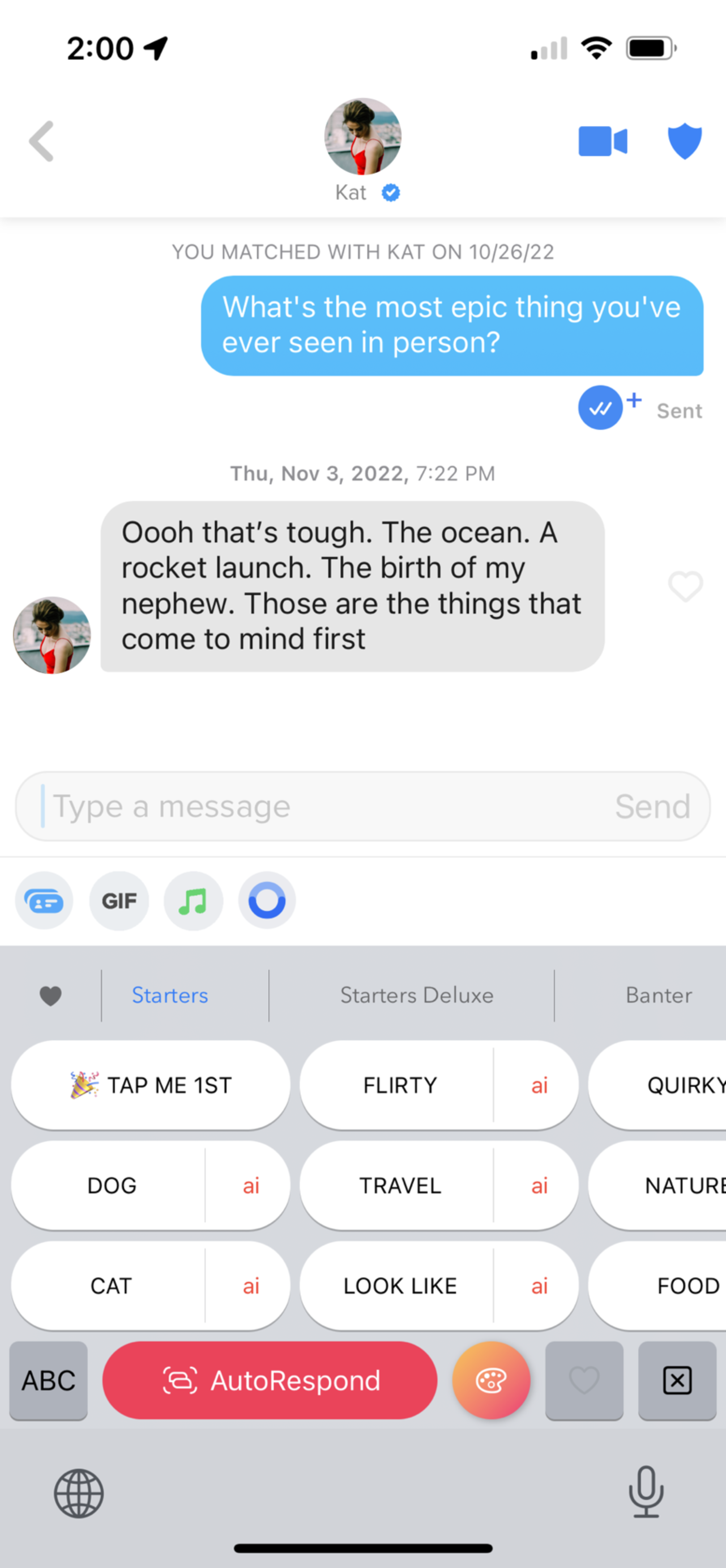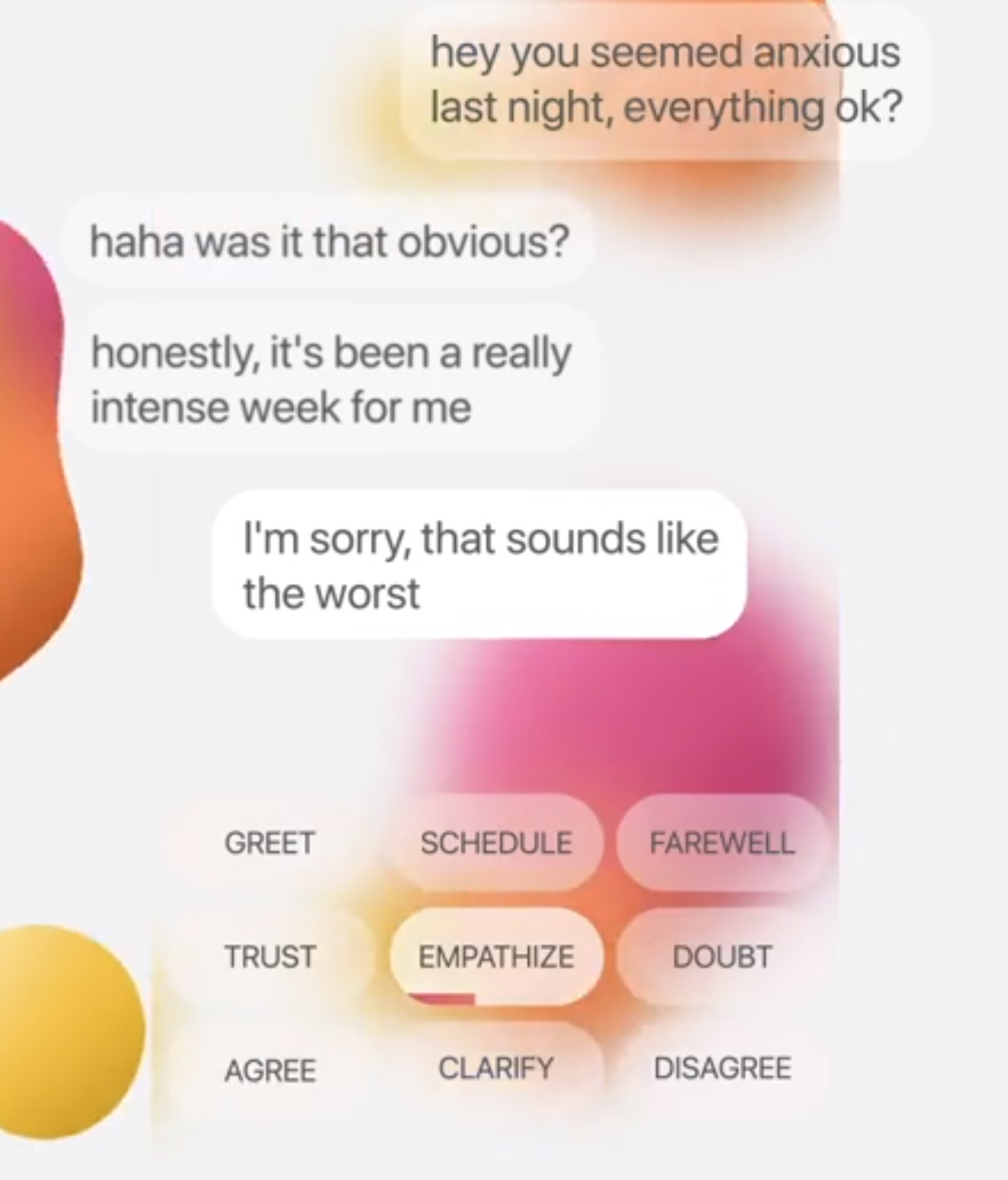One hundred thirty-five matches. Twenty-two first dates. Two situationships. A handful of red flags. And zero boyfriends. That’s my dating wrapped (opens in new tab) for 2022.
While my first year of online dating hasn’t yielded a long-term relationship (yet!), I’ve racked up countless conversations with men from across the Bay Area. But as time wore on and my dating fatigue (opens in new tab) increased, I felt many discussions lose their buzz over drinks or fade out over messaging apps.

Bubbly bursts of online messages have fizzled without so much as a goodbye. Chains of texts, even after multiple dates, have slowed to a trickle and dried up. My correspondents haven’t been the only ones guilty of ghosting (opens in new tab), but I also found that many of my male companions didn’t know how (opens in new tab) to grease the wheels of conversation by asking me questions either.
In an effort to turn those dead-end discussions around, I started carrying conversation cards in my purse. Like an emergency parachute, I could pull them out whenever I encountered a lingering awkward pause. Unfortunately, this trick is only cute the first time around.
So when I stumbled upon an Instagram advertisement for Keys AI (opens in new tab), an artificial intelligence-based generative keyboard app that will create opening lines, questions and even custom messages at the touch of a button, I was intrigued. Could this technology—downloaded 15,000 times in the last month, and 60,000 times in the last year, according to Keys’ CEO—be my robot-y Cyrano de Bergerac (opens in new tab)?

With the green light from my editor to write about my personal experience using Keys, I began popping AI-generated ice breakers into my match text boxes—querying my potential dates about what kind of weather event they would be or whether they would prefer to know the future from a fortune teller or a fortune cookie. One cutesy come-on even asks, “You’re so cute. How do I know that you’re not a robot?”
Some matches were put off by my questions. Others seemed confused. But around a dozen of my prospective suitors were apparently delighted by my seemingly thoughtful questions.
“Wow, lot’s of good ice-breaker questions,” one wrote.
“Haha, I love your questions,” wrote another.

The conversation prompts weren’t just quirky—Keys AI helped me talk on a very basic level about renewable energy with an engineer and ponder whether the future will be better than the past with a few others. But could it work magic and take me out of the dreaded purgatory that is the “talking stage” and onto an actual date?
By the time, the new year rolled around, I had been asked on two dates and Keys AI had asked out one gentleman on my behalf through its “AutoRespond” feature, which analyzes screenshots of your conversation and generates three AI responses for you to choose from. He said he would love to meet up. That’s when the anxiety kicked in.
I did not use a fake dating profile or obscure the fact I am a journalist to any of my matches. I clearly listed my profession on all of my profiles and answered questions about my career if they came up. I hand-picked all the queries I sent and avoided using auto-generated responses that would be untruthful or misrepresent myself personally or professionally. But I was still concerned about the ethics of it all.

I asked a friend how he would feel if I used Keys AI to secure a date with him. He said he’d feel a little deceived. I wondered if my impending dates would feel the same. Was I participating in some technologically twisted game of “AI fishing”?
But after a few more discussions with colleagues, I decided to take the plunge and go on a series of AI-assisted dates. Here’s how they went.
Love, Artificially
Editors’ Note: *Names have been changed at the request of some sources to protect their privacy.
“It’s good-slash-scary, depending on how you are using it,” Roy* said.
We were talking about artificial intelligence technology as we sipped cocktails at a trendy Marina bar. Just 30 minutes before, I had revealed to Roy (not his real name) that I had used Keys AI to chat with him over a dating app.
While a little surprised, he expressed curiosity about the tool I had used rather than anger or disgust. To my surprise, he agreed to talk on the record about our AI-generated conversation and date, as long as I changed his name. First, he wanted me to show him the keyboard application and how to use it.

“I should download [it],” Roy said after I showed him a few features, including how to pull up an ice breaker by pressing buttons that evoke a conversational tone, like “amusing,” “curious” or “observant.”
When I ask him how he felt about the AI-generated questions I sent to him via Keys, he said, “It’s actually a useful thing. Why not use technology if you have that?”
He also said he didn’t think San Francisco daters would balk at the idea of using this AI Cupid: “Everybody is a tech person here.”
My second date Jason* (also not his real name) is actually a machine-learning engineer with a Ph.D. in computer science. He was a little surprised when I revealed over a glass of wine and a plate of cheese that Keys AI not only fueled our conversation but also had the gumption to ask him out for me.
In retrospect, he told me, some things were a little off, including the lack of specificity in some of my auto-generated answers and the extremely courteous way I, or the AI, asked him out. “Would you care to …,” he remembered, quoting the AI.
“The writing style is pretty formal,” he said as we pored over our correspondence. “That’s pretty atypical of how I would expect most people to write.”
So why did he keep talking and, ultimately, decide to meet up with me? I asked.
He told me that he was curious to see if the seemingly formal person he was chatting with online would be the same or different in real life. But it was also the deep questions I—or rather the AI—asked. My conversation with him began with a query on whether he thought the future would be better than the present.
“It’s a pretty heavy hitter coming right out of the gate, not going to lie,” he said. “That’s why I wanted to talk with you, or this bot, more because this is not the usual pattern I encounter.”
Ultimately, he thought my dating game was clever, if a little sneaky, adding at the end of our date, “Well done.”
Futuristic Love Language
The way Taylor Margot sees it, the individual—or machine—writing the message isn’t nearly as important as the sentiment the message conveys and the person who ultimately hits “send.”
I told Margot, the CEO of Keys AI, about my own experience using his product to score dates and I asked if he worries that users of the souped-up keyboard may use it to misrepresent themselves on dating apps. The UC Berkeley law school graduate, who used to practice corporate law in the Bay Area, struck the philosophical tone of a tech entrepreneur.

He believes that AI-generated text is moving our notions of authorship in a direction where one’s voice is becoming not what one writes or types, necessarily, but the email or text you press “send” on.
Pretty soon, he thinks, AI tools like Keys will be able to mimic our own writing styles quite accurately, noting that the company has added a variety of custom filters “to prevent any sort of nefarious misuse.”
“This stuff is improving in the blink of an eye, right? Another year, it’s going to be that much better. […] It’ll be your exact voice,” he said. In other words, it won’t be a misrepresentation, but simply a representation.

Driving his point home, Margot pulled an example from his own life. A few weeks ago, he was having a really bad day—a bothersome tree in the backyard, a dog peeing all over the floor, a 10-month-old screaming nonstop. He relayed all this in an “emotional dump” of a message to his company’s board.
“And they wrote back kind of the most amazing response ever,” Margot said. It wasn’t until an hour later that Margot learned that the message was composed by Keys AI. But the sentiment of the text still held.
“I was in such a dark space. And then I was in such a good one. […] What I’m getting at here is that I felt better,” Margot said, “and that’s what I really care about—helping people feel connected, really unique, full relationships.”
Ultimately, Margot believes that Keys is one more tool in the evolution of human language—and maybe even the language of love. He argued that all language is developed through “Cyrano-esque” means from the books we read to the jargon we pick up from TikTok or Twitter.
“I really think that all language is a melting pot, and we’re just adding another straw to stir the drink,” Margot said.
As for myself, the well of curiosity may just have been replenished with the help of an AI-powered love coach in my pocket.
